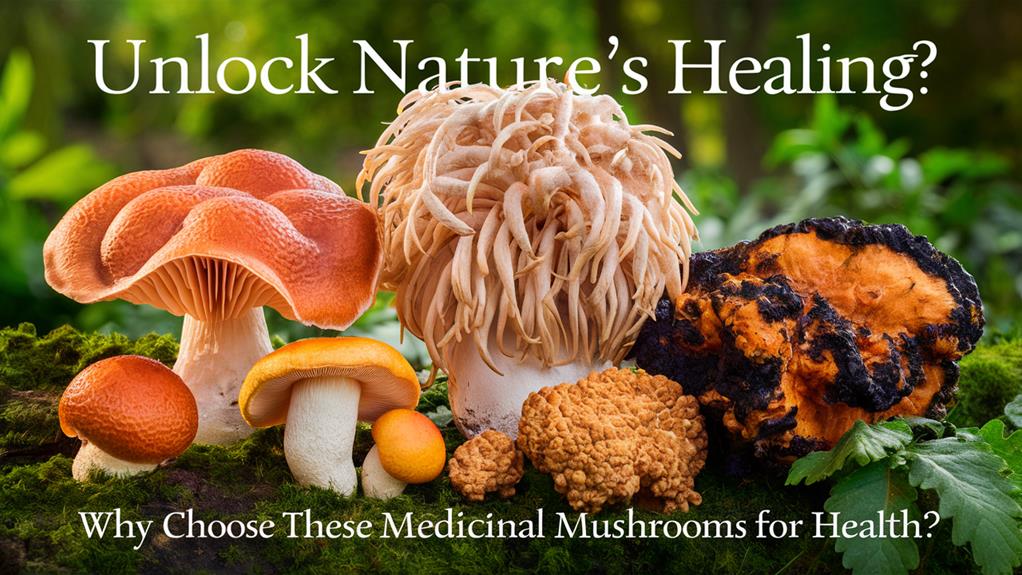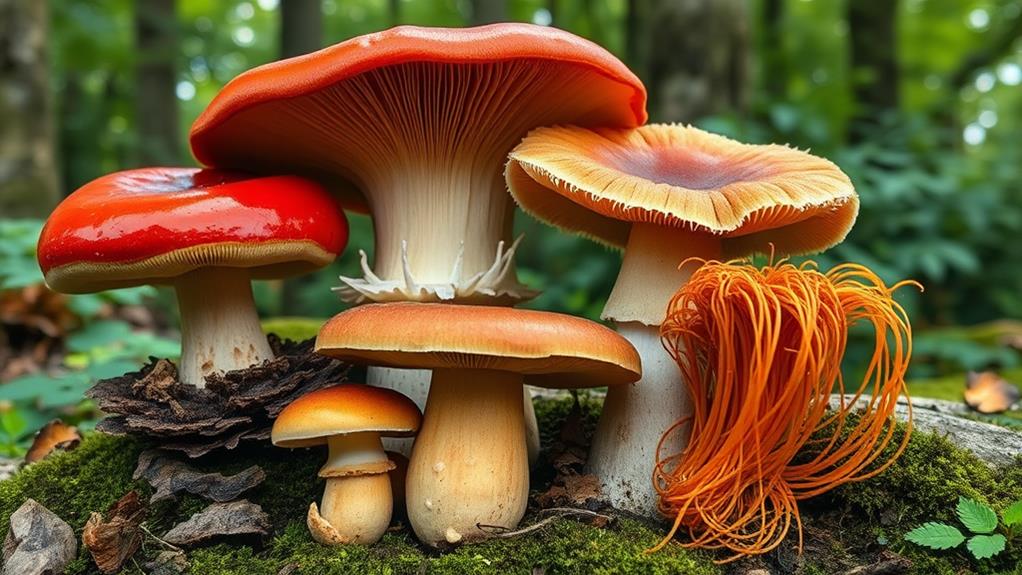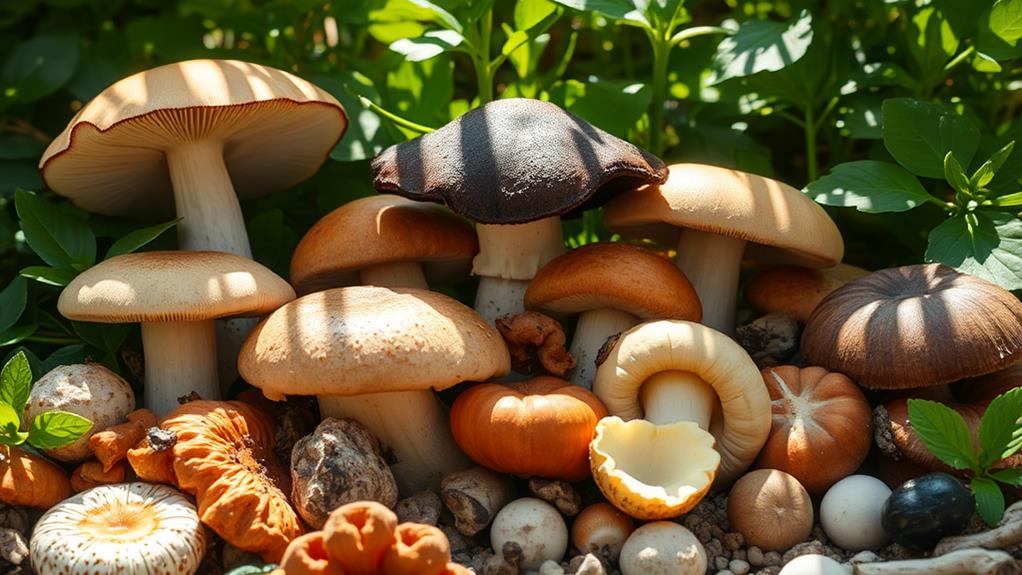
Choosing medicinal mushrooms for your health is a smart decision. These fungi offer numerous benefits, such as boosting your immune system, enhancing energy levels, and supporting heart health. Mushrooms like lion's mane improve brain function, while shiitake and maitake can lower cholesterol and manage blood sugar. They're rich in antioxidants and compounds that may reduce cancer risks by up to 45% with regular consumption. Plus, incorporating these mushrooms into your diet is easy and tasty. By understanding their unique properties, you can unlock even more health benefits that these incredible mushrooms provide.
Overview of Medicinal Mushrooms

Medicinal mushrooms have captivated health enthusiasts and researchers alike for centuries, especially in traditional Asian medicine. These fascinating fungi, like Turkey Tail Mushrooms and reishi, are packed with health benefits that many people are just starting to discover.
They're known for their rich content of polysaccharides, which are essential for boosting immune function and have been shown to enhance immune responses against cancer. Turkey Tail Mushrooms, in particular, have gained attention for their role in cancer treatments, with studies revealing anticancer effects that support their use in conjunction with conventional therapies.
They contain a powerful compound called polysaccharide-K (PSK) that has shown promise in enhancing immune responses and improving survival rates in cancer patients during clinical trials. As more research unfolds, it's becoming clear that regular consumption of medicinal mushrooms, including shiitake and maitake, could lower cancer risk significantly—up to 45% with daily intake of just 18 grams.
This growing interest in medicinal mushrooms reflects a larger trend in health and wellness. As the global market for these functional foods is projected to reach $19.3 billion by 2030, more people are turning to traditional Chinese medicine and nature's remedies to support their health.
Embracing these mushrooms could be a step towards a healthier lifestyle.
Key Bioactive Compounds
When you explore the world of mushrooms, you'll find that they contain a wealth of bioactive compounds that offer impressive health benefits. Polysaccharides, like polysaccharopeptides (PSP) and polysaccharide-K (PSK) from turkey tail mushrooms, are known for their antitumor and immunomodulatory properties, making them crucial for enhancing immune function and overall well-being.
These compounds can help your immune system fight off diseases and infections, contributing to the growing market for natural supplements that incorporate the health benefits of mushrooms.
Another important bioactive compound is ergothioneine, an antioxidant amino acid found in shiitake and oyster mushrooms. Ergothioneine protects your cells from oxidative stress, promoting overall health and well-being.
Additionally, triterpenes, particularly ganoderic acids from Ganoderma lucidum, also known as reishi, demonstrate significant antitumor effects, enhancing the mushroom's medicinal reputation.
Fungal immunomodulatory proteins (FIPs) present in various mushrooms further showcase their therapeutic potential by boosting your immune response.
Understanding these bioactive compounds and their mechanisms is essential for recognizing their roles in treating various health issues. By incorporating these mushrooms into your diet, you can harness their powerful benefits, supporting a healthier lifestyle and potentially improving your overall quality of life.
Top Medicinal Mushroom Types

When it comes to medicinal mushrooms, each type offers unique health benefits and a rich history. For example, Lion's Mane boosts brain function, while Reishi supports your immune system and helps with sleep.
Reishi mushrooms, known as the "mushroom of immortality," are recognized for their potential to enhance immune function and relieve anxiety, making them a powerful addition to your wellness routine boost immune function.
Plus, many of these mushrooms aren't just for health; they also add delicious flavors to your cooking, making them a tasty addition to your meals.
Health Benefits Overview
Five top medicinal mushrooms have gained attention for their impressive health benefits, each offering unique properties that can enhance your well-being.
For instance, Lion's Mane Mushroom promotes nerve growth factor (NGF) synthesis, which boosts cognitive function. Traditionally used for digestion and energy, it's a great addition to your health routine.
Reishi Mushroom is renowned for its potent immunomodulatory properties, supporting your immune health and aiding in restful sleep. Many believe it contributes to longevity, making it a worthwhile supplement.
Cordyceps Mushroom is another powerhouse, increasing ATP production that enhances your energy and exercise performance. Valued in Chinese medicine, it's perfect for those needing stamina.
Turkey Tail Mushroom contains polysaccharopeptides (PSP) that help support immune function. Research shows it may improve survival rates in cancer patients undergoing chemotherapy, highlighting its importance in health.
Lastly, Shiitake Mushroom is rich in lentinans, which bolster your immune response and help lower cholesterol.
Plus, it adds great flavor to meals, benefiting your heart health. By incorporating these mushrooms into your diet, you can tap into their medicinal properties and support your overall health.
Historical Significance
The rich history of medicinal mushrooms reveals their deep-rooted significance in various cultures, where they've been cherished for their health benefits.
Reishi mushrooms, for instance, were used by Chinese royalty for centuries, celebrated for their immune-boosting properties and longevity.
Meanwhile, the Turkey Tail mushroom has been a staple in Asian medicine, particularly for cancer treatment, since the 1970s when it was approved for clinical use in Japan.
Shiitake mushrooms aren't just a culinary delight; they've held cultural relevance in Japan and China for their ability to enhance the immune system and support heart health.
Similarly, Maitake mushrooms have been traditionally utilized in Japan for their immune-enhancing effects and potential benefits in managing blood sugar and cholesterol levels.
Lastly, Chaga mushrooms have a long history in Siberian folk medicine, recognized for their high antioxidant content and immune-modulating properties.
Each of these mushrooms embodies traditional health practices that emphasize natural remedies, showcasing their enduring importance across generations.
Usage in Cooking
Incorporating medicinal mushrooms into your cooking not only elevates flavors but also enhances your meals with numerous health benefits.
Take shiitake mushrooms, for instance. They add a rich, savory taste and are packed with lentinans that boost your immune system and may help lower cholesterol levels.
Maitake mushrooms are another great option; their high beta-glucan content supports immune function and helps regulate blood sugar.
Don't forget about reishi mushrooms, which are often used in teas or soups. They're prized for their calming effects and can promote restful sleep while acting as a potent immunomodulator.
Turkey tail mushrooms, known for their polysaccharopeptides, can be added to broths or taken as a supplement to bolster immune health, especially beneficial during cancer treatment.
You might also enjoy oyster mushrooms, which are versatile in various recipes. They provide heart health benefits due to their low-calorie profile and cholesterol-lowering compounds.
By integrating these mushrooms into your cooking, you can create delicious meals that nourish your body and support overall health.
Cancer Risk Reduction
When you include mushrooms in your daily diet, you might significantly reduce your cancer risk. Research shows that consuming just 18 grams of mushrooms daily can lower cancer risk by 45%.
This potential protective effect comes from mushrooms like shiitake, oyster, and maitake, which are rich in ergothioneine. This powerful antioxidant amino acid helps protect your cells from damage that can lead to cancer.
Medicinal mushrooms also contain polysaccharides, particularly found in turkey tail, which have impressive antitumor effects and can improve immune responses against cancer cells.
Clinical studies support these findings, showing that compounds like lentinan in shiitake mushrooms can enhance chemotherapy's effectiveness while alleviating side effects.
Cardiovascular Health Benefits

Including mushrooms in your diet can provide significant cardiovascular health benefits. These tasty fungi, like shiitake and oyster mushrooms, contain compounds that help lower cholesterol levels. Shiitake mushrooms inhibit cholesterol production and absorption, while oyster mushrooms are known to contain lovastatin, a natural substance that further supports heart health.
Regularly eating mushrooms, such as maitake, can also help regulate blood sugar levels. This is important because maintaining stable blood sugar can contribute to better cardiovascular health. Additionally, mushrooms are rich in ergothioneine, a powerful antioxidant that protects your body from oxidative stress. This protection can reduce the risk of heart disease, supporting overall cardiovascular function.
Moreover, incorporating mushrooms into your meals can help lower sodium intake, which is linked to better blood pressure control. By managing your blood pressure, you further promote heart health.
Brain Health Support
The benefits of medicinal mushrooms for brain health are gaining significant attention, particularly with varieties like Lion's Mane leading the charge. This remarkable mushroom promotes the synthesis of nerve growth factor (NGF), which enhances cognitive function and supports brain health.
If you're concerned about mild cognitive impairment, incorporating Lion's Mane into your daily routine could be beneficial. Studies suggest that eating over two cups of mushrooms weekly can reduce the risk of mild cognitive impairment by 50%.
Regular intake of Lion's Mane, with just a ½ teaspoon daily in your smoothies or beverages, can significantly improve your cognitive abilities.
But it doesn't stop there—other mushrooms, like Shiitake and Oyster, are packed with antioxidants that help combat oxidative stress, a major player in cognitive decline and neurodegenerative diseases.
Additionally, consider adding Reishi Mushroom to your regimen. Known for its calming effects, it aids in restful sleep, which is essential for optimal brain performance.
Immune System Enhancement

When it comes to boosting your immune system, medicinal mushrooms offer impressive benefits.
Turkey Tail, Reishi, and Shiitake are packed with key nutrients that stimulate your body's defenses, helping you fight off infections more effectively.
Immune Boosting Properties
Medicinal mushrooms are powerful allies in boosting your immune system. They contain essential compounds that enhance immune function and help your body fight infections. For example, Turkey Tail mushrooms are rich in polysaccharopeptides (PSP), which activate immune cells like natural killer cells and T-cells. This activation improves your body's ability to combat diseases.
Here are a few reasons to consider adding medicinal mushrooms to your routine:
- Enhanced immune response: Shiitake mushrooms stimulate the production of immune cells, increasing your resistance to pathogens.
- Balanced immune reaction: Reishi mushrooms contain beta-glucans that help modulate your immune system, reducing inflammation for overall health.
- Proven effectiveness: Clinical studies show that Turkey Tail extract can improve immune function and even survival rates in cancer patients.
Regularly consuming these mushrooms can serve as preventive health measures, with studies indicating that just 18 grams daily can significantly reduce cancer risk.
Key Nutrients Involved
Boosting your immune system effectively hinges on key nutrients found in various mushrooms. These fungi possess impressive medicinal properties, making them valuable allies in your health journey.
For instance, mushrooms like Reishi and Turkey Tail are rich in polysaccharides, specifically beta-glucans, which help stimulate immune cells such as macrophages and natural killer cells. This means they can enhance your immune response.
Shiitake mushrooms are another great option. They contain lentinans that not only boost your immune response but also increase the production of immune cells, contributing to overall health.
Additionally, mushrooms like Cremini provide selenium, a crucial nutrient for producing antioxidant enzymes that protect against oxidative stress, further supporting your immune system.
Chaga and Maitake mushrooms are high in antioxidants and polysaccharides, helping to modulate your immune system, which can improve its ability to fight infections.
Regularly including these mushrooms in your diet has even been linked to a 45% reduction in cancer risk, highlighting their important role in promoting longevity and health.
Digestive Health Improvement
Many people overlook the powerful impact that certain mushrooms can have on digestive health. Medicinal mushrooms, like shiitake and maitake, contain polysaccharides that act as prebiotics. These compounds promote the growth of beneficial gut bacteria, which is essential for maintaining gut health.
Research shows that incorporating these mushrooms into your diet can significantly improve the diversity of your gut microbiome, leading to enhanced digestive wellness.
Here are some key benefits of medicinal mushrooms for your digestion:
- Boosts beneficial gut bacteria: They help create a thriving environment for good bacteria.
- Supports immune function: Turkey tail mushroom enhances the immune system in your gastrointestinal tract.
- Reduces gut inflammation: Chaga mushroom's high antioxidant content helps alleviate symptoms of digestive disorders.
Including these mushrooms in your meals can be a game changer for your digestive function.
With their ability to reduce inflammation and support overall gut health, they're a valuable addition for anyone looking to improve their digestive wellness.
Vitamin D Sources

When it comes to dietary sources of vitamin D, mushrooms stand out as a unique option that can elevate your nutrient intake. Certain varieties like white button, portabella, and cremini can provide a significant amount of vitamin D, especially when exposed to UV light.
In fact, one serving can give you up to 1,000 IU of this essential nutrient!
Mushrooms are particularly interesting because they contain both vitamin D2 and can convert to vitamin D3, which is more effective at raising your vitamin D levels. Regular consumption of these vitamin D-rich mushrooms can help you meet the daily recommended intake of 600-800 IU, especially if you get limited sun exposure.
For those following plant-based diets, mushrooms offer a vegan-friendly alternative to animal sources of vitamin D. This makes them an excellent choice for supporting not just bone health, but also your immune system.
Plus, incorporating mushrooms into your meals is a delicious way to boost your vitamin D intake, particularly during winter months when sunlight is scarce.
Incorporating Mushrooms Into Diet
Mushrooms not only enhance your vitamin D intake but also offer a versatile ingredient for meals. Incorporating a variety of mushrooms, like shiitake, maitake, and reishi, into your diet can significantly boost your immune system.
These mushrooms contain beta-glucans and polysaccharides that enhance immune response and support natural killer cells, which are vital for fighting off illnesses.
Here are a few easy ways to include mushrooms in your meals:
- Add sliced mushrooms to salads for extra flavor and nutrition.
- Use mushrooms as a low-calorie substitute in pasta dishes or stir-fries to help maintain healthy blood pressure.
- Blend powdered mushrooms, like cordyceps or chaga, into your smoothies for improved exercise performance and recovery.
Regularly consuming mushrooms can also help reduce cancer risk, with studies suggesting that eating just 18 grams daily may lower your chances by 45%.
Plus, certain mushrooms exposed to UV light are great sources of vitamin D, which is essential for bone health.
Conclusion
Incorporating medicinal mushrooms into your diet can be like adding a burst of life to your plate. With their numerous health benefits, from boosting your immune system to supporting heart health, these fungi are nature's little powerhouses. By exploring different types, you'll discover flavors and nutrients that enhance your well-being. So, why not sprinkle some into your meals? You're not just eating mushrooms; you're inviting a world of health benefits into your life.
